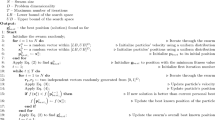Abstract
This brief paper reports a hybrid algorithm we developed recently to solve the global optimization problems of multimodal functions, by combining the advantages of two powerful population-based metaheuristics—differential evolution (DE) and particle swarm optimization (PSO). In the hybrid denoted by DEPSO, each individual in one generation chooses its evolution method, DE or PSO, in a statistical learning way. The choice depends on the relative success ratio of the two methods in a previous learning period. The proposed DEPSO is compared with its PSO and DE parents, two advanced DE variants one of which is suggested by the originators of DE, two advanced PSO variants one of which is acknowledged as a recent standard by PSO community, and also a previous DEPSO. Benchmark tests demonstrate that the DEPSO is more competent for the global optimization of multimodal functions due to its high optimization quality.
Similar content being viewed by others
References
Clerc M, Kennedy J. The particle swarm: explosion, stability and convergence in a multi-dimensional complex space. IEEE Trans Evol Comput, 2002, 6(1): 58–73
Price K, Storn R M, Lampinen J A. Differential Evolution: a Practical Approach to Global optimization (Natural Computing Series). New York: Springer, 2005
Kennedy J, Mendes R. Population structure and particle swarm performance. In: Proceedings of the W-orld Congress on Co- mputational Intelligence, Honolulu, HI, USA, 2002. 1671–1676
Chen J, Xin B, Peng Z H, et al. Optimal contraction theorem for exploration-exploitation tradeoff in search and optimization. IEEE Trans Syst Man Cybern-Part A: Syst & Human, 2009, 39(3): 680–691
Eiben A E, Hinterding R, Michalewicz Z. Parameter control in evolutionary algorithms. IEEE Trans Evol Comput, 1999, 3(2): 124–141
Brest J, Greiner S, Boskovic B, et al. Self-adapting control parameters in differential evolution: A comparative study on numerical benchmark problems. IEEE Trans Evol Comput, 2006, 10(6): 646–657
Liang J J, Qin A K, Suganthan P N, et al. Comprehensive learning particle swarm optimizer for global optimization of multimodal funcions. IEEE Trans Evol Comput, 2006, 10(3): 281–295
Zhang W J, Xie X F. DEPSO: Hybrid particle swarm with differential evolution operator. In: Proceedings of IEEE International Conference on System, Man, Cybernetics, Washington, DC, USA, 2003. 3816–3821
Author information
Authors and Affiliations
Corresponding author
Additional information
Supported by the National Natural Science Foundation of China (Grant No. 60374069), and the Foundation of the Key Laboratory of Complex Systems and Intelligent Science, Institute of Automation, Chinese Academy of Sciences (Grant No. 20060104)
Rights and permissions
About this article
Cite this article
Chen, J., Xin, B., Peng, Z. et al. Statistical learning makes the hybridization of particle swarm and differential evolution more efficient—A novel hybrid optimizer. Sci. China Ser. F-Inf. Sci. 52, 1278–1282 (2009). https://doi.org/10.1007/s11432-009-0119-4
Received:
Accepted:
Published:
Issue Date:
DOI: https://doi.org/10.1007/s11432-009-0119-4




